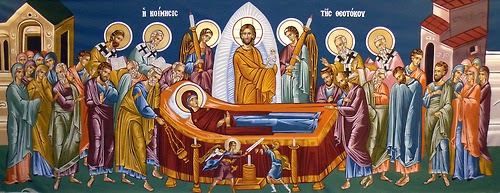For today's feast of the Dormition of the Mother of God (the Assumption in Roman Catholicism; simply the feast of St Mary the Virgin in Anglicanism), we turn once more to Russian Orthodox theologian Sergius Bulgakov, who provides insights into how Mary's post-earthly existence--variously understood as passing directly into heaven without dying, or experiencing a post-mortem resurrection similar to that of Jesus--is an instance of the divinization or theosis which is God's intention for all of us. The excerpt below is found on pp 76-77 of The Burning Bush: on the Orthodox Veneration of the Mother of God, Thomas Allan Smith, translator, Eerdmans, 2009.
+++++++++++++++++++++++++++++++++++++++++++++++++++++++++++++++++++++++++++
...in her glorification the Mother of God receives through the Son from the Father the glory and power which are not inherently hers according to human nature. This is divinization in the precise sense, a canopy of divine graced life unfurling over that being in which it is not inherent and which it transcends. Because of this the whole difference between the Son and the Mother, between His and her power and glory, remains. The first is boundless and unlimited, absolute, as the power of God in creation. The second is derivative, a graced giveness, and in virtue of this derivativeness it is not unlimited, not absolute. In other words, the Lord is God by nature, the Mother of God is not God by nature, but only by grace, no matter how full and complete her divinization is. In her person is fulfilled only what is foreordained for all humans: "I said, you are gods" (Ps 82.6; cf Jn 10.34-35).
...She is the petitioner on behalf of the human race and the mediator between God and human beings as a glorified and divinized human. If the Lord is the petitioner and high priest in His capacity as the one offering Himself in sacrifice, she is the petitioner before Him...He joins in Himself two natures, but she raises up in herself, elevates to God humanity and all creatures. As a creature, she does not participate in the divine life of the Most Holy Trinity according to nature, as does her Son; she only partakes of it by the grace of divinization. But this grace is given to her already in a maximum and definitive degree, so that by its power she is the Heavenly Queen. Between her and all the saints, no matter how exalted, angels or men, there remains an impenetrable border, for to none of them does the Church cry out save us, but only pray to God for us. With respect to the whole human race she is already found on the other side of resurrection and last judgement; neither the one nor the other has any force for her...She is the already glorified creation before its general resurrection and glorification; she is the already accomplished Kingdom of Glory, while the world still remains "in the kingdom of grace."
+++++++++++++++++++++++++++++++++++++++++++++++++++++++++++++++++++++++++++
...in her glorification the Mother of God receives through the Son from the Father the glory and power which are not inherently hers according to human nature. This is divinization in the precise sense, a canopy of divine graced life unfurling over that being in which it is not inherent and which it transcends. Because of this the whole difference between the Son and the Mother, between His and her power and glory, remains. The first is boundless and unlimited, absolute, as the power of God in creation. The second is derivative, a graced giveness, and in virtue of this derivativeness it is not unlimited, not absolute. In other words, the Lord is God by nature, the Mother of God is not God by nature, but only by grace, no matter how full and complete her divinization is. In her person is fulfilled only what is foreordained for all humans: "I said, you are gods" (Ps 82.6; cf Jn 10.34-35).
...She is the petitioner on behalf of the human race and the mediator between God and human beings as a glorified and divinized human. If the Lord is the petitioner and high priest in His capacity as the one offering Himself in sacrifice, she is the petitioner before Him...He joins in Himself two natures, but she raises up in herself, elevates to God humanity and all creatures. As a creature, she does not participate in the divine life of the Most Holy Trinity according to nature, as does her Son; she only partakes of it by the grace of divinization. But this grace is given to her already in a maximum and definitive degree, so that by its power she is the Heavenly Queen. Between her and all the saints, no matter how exalted, angels or men, there remains an impenetrable border, for to none of them does the Church cry out save us, but only pray to God for us. With respect to the whole human race she is already found on the other side of resurrection and last judgement; neither the one nor the other has any force for her...She is the already glorified creation before its general resurrection and glorification; she is the already accomplished Kingdom of Glory, while the world still remains "in the kingdom of grace."
This entry was posted
on Friday, August 15, 2014
at Friday, August 15, 2014
. You can follow any responses to this entry through the
comments feed
.







